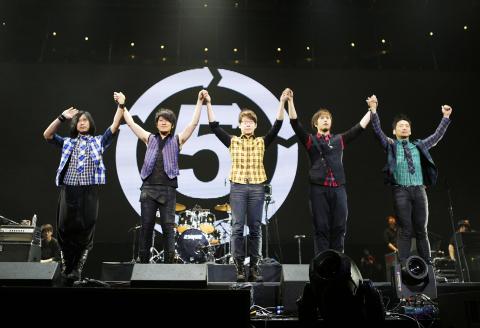Right around the time that President Ma Ying-jeou (馬英九) issued a statement saying he would not meet to discuss the cross-strait service trade agreement with students who have occupied the Legislative Yuan since March 18, Mayday lead vocalist Ashin (阿信) stood on the stage of a packed Madison Square Garden, where his idol John Lennon played 40 years earlier, and began to choke up.
Ashin said he forgot to call his mother back home in Taiwan for her birthday, perhaps because of the difference in time. When Ashin finally reached her, his mother was not in the best of spirits.
“Mom said she wasn’t happy because our home was in the midst of unprecedented uncertainty,” Ashin said, as Stone (石頭), one of the guitarists, held his head and wept.

Photo: Chen Hui-ling, Taipei Times
“I wish someone could tell us what our future holds. I was once able to envision a place where everybody trusted one another, where everybody paid attention to one another, where the strong listened closely to the fears of the weak.
“But these past few days, I can no longer see that place.”
Although Ashin did not mention Taiwan, the trade pact or the occupation of the Legislative Yuan directly by name, for the thousands of Taiwanese fans who came to watch Mayday make history as the first Mandarin band to perform at Madison Square Garden, Ashin was speaking directly to them, their struggle and their country.
Bursts of “Go Taiwan!” (台灣加油) ricocheted through the arena; some fans wrapped themselves in the Republic of China flag. Others lifted their glow-sticks and lighted cellphones. Everyone was listening.
Planned long before students occupied the Legislative Yuan and Executive Yuan this past week to protest the pact — a trade agreement that opponents say will give China unfair competitive advantages in Taiwan’s economy — Mayday’s concert in New York attracted mostly Chinese and Taiwanese fans eager to hear the Taiwanese alternative rock band perform favorites like Racing Car (軋車) and Embrace (擁抱). But the student protests were still on everyone’s mind.
During a press conference after the concert, reporters asked Ashin about his on-stage remarks and whether they were directed at Taiwan. Ashin did not elaborate further, and when one reporter asked a related follow-up question, a Mayday spokeswoman told journalists to confine their questions to the group’s efforts over the last 15 years that have gotten them to where they are today.
In the past, Mayday has lent its name to a number of social causes in Taiwan, including the government’s seizure of land for industrial use in Miaoli County’s Dapu Borough (大埔) in 2010; the construction of a fourth nuclear power plant in 2011; and the death of army corporal Hung Chung-chiu (洪仲丘), who collapsed during a punishment training exercise last year. Unlike the cross-strait trade agreement, none of those issues involved China.
Debate about the band’s position on the trade pact surfaced Friday, when the Taipei Times’ sister newspaper the Liberty Times reported that Ashin angered some Chinese fans after the band’s rousing, anthemic music video Qilai (起來) was posted on Mayday’s Facebook page. Some Taiwanese interpreted this as the band’s endorsement of protests in Taiwan. Soon after, Chinese fans took to Weibo, China’s most popular microblog, and blasted Ashin as an “artist who supports Taiwanese independence,” the article reported. If “Ashin doesn’t like China, he can get the hell out,” wrote a Weibo user, according to the article.
Concert-goers interviewed outside the venue — Chinese and Taiwanese alike — took the news about Ashin and Mayday in stride, saying that he and his fellow band members have the right to express whatever views they wish, even if the audience disagrees.
Daphine Hu (胡丹), from China, said she has many Taiwanese friends in New York and said she would never let politics interfere in her relationships with them.
“I think democracy is fine, and I’m also against these kinds of ‘black-box’ negotiations,” she said, referring to the Mandarin word heixiang (黑箱), used to describe something that lacks transparency. “I just hope people are not misled. Kids are easily manipulated because of an issue. Kids might protest just for the sake of protesting.”
Alina Tseng (曾怡嘉), from Taiwan, said that Ashin’s views and his music “are two separate issues.” Her three girlfriends, who accompanied her to the concert, agreed.
“Ashin was speaking as a Taiwanese and not for Mayday,” Tseng said. “He might have been saying that passing the trade agreement might not be so good for Taiwan’s future. But if a music band wants to make money, of course, China’s market is so big. That’s what the trend is.”
Joe Nong (農炎昭), from China, added that he believed singers have the “freedom” to speak out about their own social and political views. “I personally want to see China and Taiwan united, so if Mayday made its political views more public, I probably would not be very happy,” Nong explained. “From another perspective, Mayday comes to China to make money because that’s where the market is.”
Mayday’s whirlwind tour, which began Feb. 8 and has taken the group across Asia, Europe and North America, will end in California at the Los Angeles Sports Arena on Saturday. Chika Lin (林知佳), a spokeswoman for B’in Music (相信音樂), Mayday’s record label, said in a statement that one goal of Mayday’s Now-Here World Tour was to bring the group, which is celebrating its 15th anniversary, out onto the international stage and introduce westerners to its music.
While Asians made up most of the 14,000 fans attending the concert, there were some western faces in the audience. Ashin told the Taipei Times that this was the first time the band had toured more than 10 venues in Europe and North America, so naturally the audience would still mostly be Asian.
“But gradually, the second time around, you will see more and more western friends,” Ashin said. “And for our next tour, we will also have English-language singles.”
Ashin paused.
“Even the drums will sound like they’re speaking English,” he added.

Following the rollercoaster ride of 2025, next year is already shaping up to be dramatic. The ongoing constitutional crises and the nine-in-one local elections are already dominating the landscape. The constitutional crises are the ones to lose sleep over. Though much business is still being conducted, crucial items such as next year’s budget, civil servant pensions and the proposed eight-year NT$1.25 trillion (approx US$40 billion) special defense budget are still being contested. There are, however, two glimmers of hope. One is that the legally contested move by five of the eight grand justices on the Constitutional Court’s ad hoc move

Stepping off the busy through-road at Yongan Market Station, lights flashing, horns honking, I turn down a small side street and into the warm embrace of my favorite hole-in-the-wall gem, the Hoi An Banh Mi shop (越南會安麵包), red flags and yellow lanterns waving outside. “Little sister, we were wondering where you’ve been, we haven’t seen you in ages!” the owners call out with a smile. It’s been seven days. The restaurant is run by Huang Jin-chuan (黃錦泉), who is married to a local, and her little sister Eva, who helps out on weekends, having also moved to New Taipei

The Directorate-General of Budget, Accounting and Statistics (DGBAS) told legislators last week that because the Chinese Nationalist Party (KMT) and Taiwan People’s Party (TPP) are continuing to block next year’s budget from passing, the nation could lose 1.5 percent of its GDP growth next year. According to the DGBAS report, officials presented to the legislature, the 2026 budget proposal includes NT$299.2 billion in funding for new projects and funding increases for various government functions. This funding only becomes available when the legislature approves it. The DGBAS estimates that every NT$10 billion in government money not spent shaves 0.05 percent off

Dec. 29 to Jan. 4 Like the Taoist Baode Temple (保德宮) featured in last week’s column, there’s little at first glance to suggest that Taipei’s Independence Presbyterian Church in Xinbeitou (自立長老會新北投教會) has Indigenous roots. One hint is a small sign on the facade reading “Ketagalan Presbyterian Mission Association” — Ketagalan being an collective term for the Pingpu (plains Indigenous) groups who once inhabited much of northern Taiwan. Inside, a display on the back wall introduces the congregation’s founder Pan Shui-tu (潘水土), a member of the Pingpu settlement of Kipatauw, and provides information about the Ketagalan and their early involvement with Christianity. Most